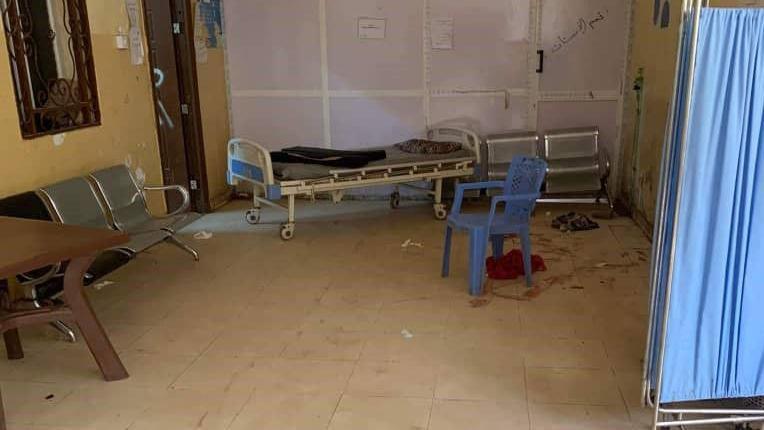Last civilian hospital in besieged Sudan city closed

It is not clear how many people died in the attack
- Published
Doctors at one of the last functioning hospitals in the besieged Sudanese city of el-Fasher say they've been forced to close down the facility after it was attacked.
The country is in the midst of a devastating civil war that began 14 months ago.
El-Fasher is the only city still under army control in the entire Darfur region.
The hospital has been supported by the medical charity Médecins Sans Frontières (MSF) which had described it as the only one left in el-Fasher where injured civilians could receive treatment.
For several days there had been reports of shells hitting the city's South Hospital, causing injuries and deaths.
But eyewitnesses say the paramilitary Rapid Support Forces (RSF) entered the facility on Saturday, causing chaos.
According to accounts, gunmen drove up to the hospital and opened fire - looting drugs and medical equipment, stealing an ambulance and assaulting staff.
"Due to the chaos, our team was unable to verify if there were any dead or wounded," the medical charity's interim head of mission in Sudan, Maximilien Kowalski, told BBC Newsday.
Medics at the hospital had told the BBC days earlier that they were planning to relocate it because of security concerns.
When it was attacked on Saturday, thankfully only 10 patients and a reduced medical team were at the facility, MSF says.
"The hospital is really close to the frontline, so it will remain closed for now," the medical charity's Sudan chief tells the BBC.
Fuel, electricity and water supplies do not yet work at the nearby dilapidated Saudi Hospital where MSF is having to move their el-Fasher operations, says Mr Kowalski, leaving injured civilians with nowhere to go for at least a week.
Saturday's attack is yet another sign that there are no rules in the Sudanese civil war.
"Opening fire inside a hospital crosses a line," says MSF Head of Emergencies Michel Lacharite. He calls the attack "outrageous" and says "the responsibility lies with warring parties to spare medical facilities".
The Sudanese national army, which has been fighting the RSF over the past year, has also been accused of widespread abuses.
But in this case the RSF has forced a hospital where civilians were being treated to shut down.
The suspension of activities at the hospital is a major setback for the people of el-Fasher as it was the main referral facility for treating the war-wounded.
It was “the only one equipped to manage mass casualties and one of two hospitals with surgical capacity,” according to the MSF, which says more than 1,300 injured people have sought treatment there in the past month alone.
Sudan's paramilitary RSF force is widely reported to be backed by the United Arab Emirates - officials there deny it.
Across the country, more than 15,000 people are estimated to have been killed since the conflict started in April 2023, while almost nine million have been forced to flee their homes - more than in any other conflict in the world.
The RSF took control of Gezira state, to the south of the capital, Khartoum, in December and has been accused of carrying out numerous abuses against civilians there - which it denies.
Last week, at least 150 people, including 35 children, were massacred by suspected RSF forces in the village of Wad al-Nourah in Gezira state.
In Darfur, rights groups have said the RSF is using rape as a weapon of war, and is targeting darker-skinned Masalit people and other non-Arab groups in a campaign of ethnic cleansing.
Several rounds of peace talks have failed to end the war, which began when the two generals leading the army and RSF respectively fell out.
UN agencies say the fighting has sparked the world’s largest displacement crisis and that millions are facing a hunger catastrophe as a result.
More BBC stories on Sudan's civil war:


Go to BBCAfrica.com, external for more news from the African continent.
Follow us on Twitter @BBCAfrica, external, on Facebook at BBC Africa, external or on Instagram at bbcafrica, external